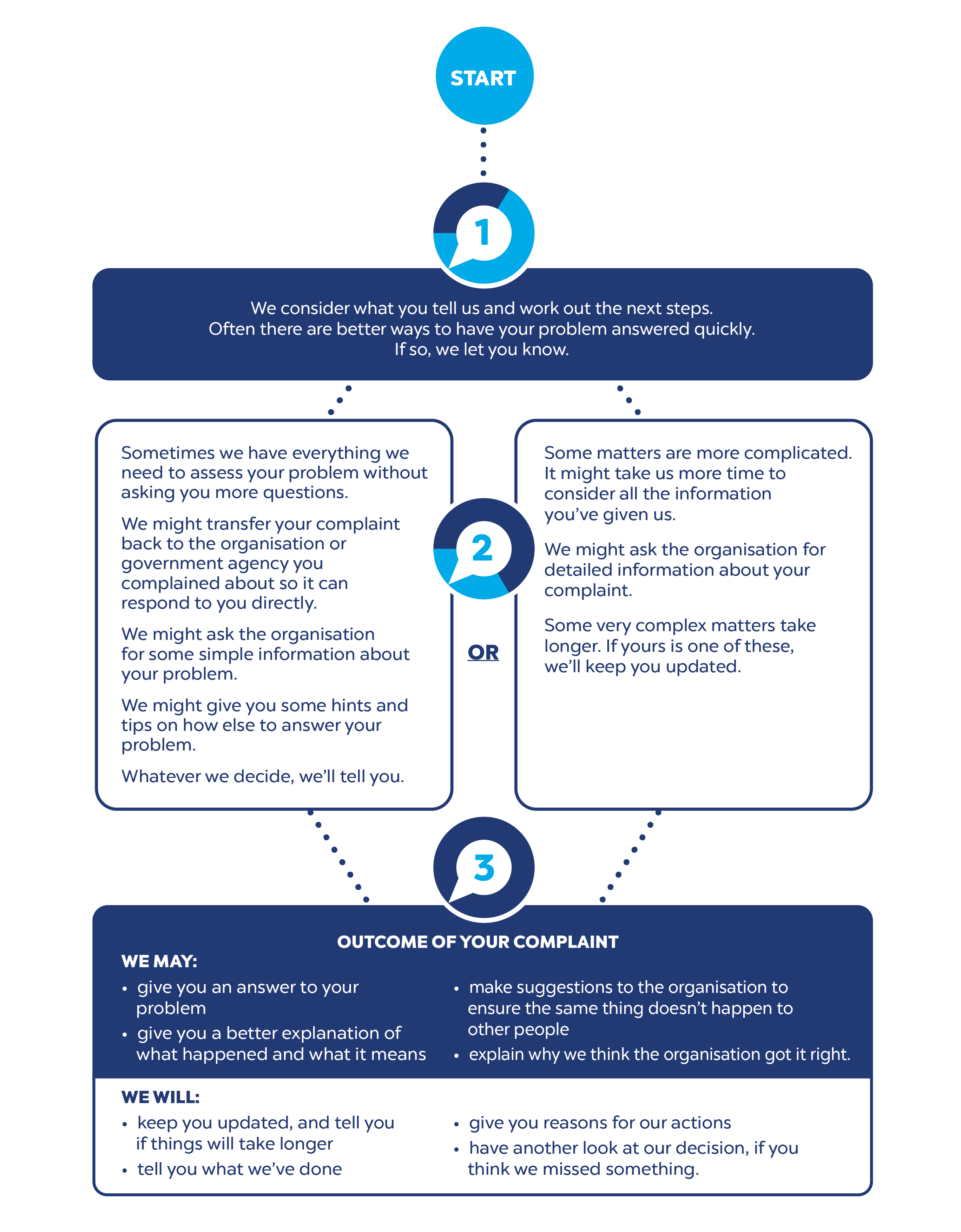Can we help you
Step 1: Raise a formal complaint with the agency, education provider or organisation (the agency) and wait for a response.
- Record a complaint reference number and the date you lodged your complaint.
- In most cases the agency will publish its complaint process online or advise you how to make a complaint in their decision notification.
- If you don’t receive a response within the agency’s published timeframe, you should contact them to follow up.
- The agency may ask you for more information to help it assess your complaint.
- We will not, and in some cases cannot, accept your complaint if you have not made a complaint to the agency first.
Step 2: If you are not satisfied with the way your complaint was handled or the outcome, you should discuss this with the agency first.
- If your matter is urgent, you should consider phoning the agency.
Step 3: If your issue remains unresolved, contact the Office.
Tips and advice for making a complaint
Even though you may be feeling angry and frustrated, it is important you:
- stay calm and co-operate with the person assessing your complaint (avoid being abusive or aggressive)
- focus on the problem and identify the key issue(s) that you want to complain about. Be clear and concise.
- Stick to the facts and include dates and reference numbers. It is important to tell us about your issues in order.
- Consider how you would like your complaint resolved—be realistic and practical about your desired outcomes.
In our experience it is usually best to put your complaint in writing if the issue is complex or you have already tried to resolve the issue with a phone call.
What can I complain to the Commonwealth Ombudsman about?
We can assess complaints about the actions of Australian Government agencies and prescribed private sector organisations that we oversee, if we consider the actions were:
- wrong
- unjust
- unlawful
- discriminatory, or
- unfair.
Who can complain to the Ombudsman?
Anyone can make a complaint to the Ombudsman.
If you do not want to, or can’t make the complaint yourself, you can ask someone else to complain on your behalf.
If the person acting on your behalf is not your legal guardian or legal representative, you need to give us your consent for that person to communicate with us when you make a complaint using our online complaint form. You can also call us on 1300 362 072.
What does it cost?
Our service is free.
Can I make an anonymous complaint?
Yes. The Ombudsman accepts anonymous or 'whistleblower' complaints. However, we will not investigate unless we consider:
- the complaint raises a serious matter
- there is enough information in the complaint to enable us to conduct an investigation.
How do I make a complaint?
The best way to make a complaint is by using our online complaint form. You can also call us on 1300 362 072. If you need an interpreter or the National Relay Service see contact us.
How long will it take to finalise my complaint?
Most complaints can be dealt with quickly. Others may take months to investigate.
We try to deal with your complaint as soon as possible, and we will keep you informed of the progress.
What happens to my complaint?
This is what you can expect after you lodge your complaint:

What can I expect from the Ombudsman?
You can expect us to:
- Be professional and courteous.
- Provide an independent and impartial assessment of your complaint.
- Undertake confidential, free and prompt assessment of your complaint in a way that is fair to everyone.
- Provide clear explanations about what we can and cannot do.
- Provide you information about any decision we make.
- Keep you informed of the progress of your complaint.
See our service charter for more detail.
What if I want to complain about the Ombudsman's decision or actions?
Our Service
If you are dissatisfied with an aspect of our service, you can talk with the member of staff who has been dealing with your complaint. If you are not happy with their response you can lodge a complaint using our webform or by calling 1300 362 072.
We take complaints about our service seriously. These complaints are assessed by Managers.
Our Decisions
You can discuss the progress or outcome of your complaint with the officer handling the matter.
If you don’t agree with our decision, you are welcome to provide:
- additional evidence
- extra information or your view of the facts
- the reasons you disagree with our decision.
The Officer will use this information to reconsider their decision.
Review
If you disagree with our final decision, you can ask us to review it. You must request a review in writing within three months of our decision.
Review information sheet and request form
A senior officer who was not involved in the original investigation of your complaint will conduct the review.
